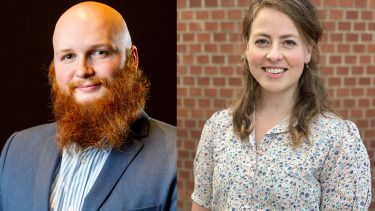They are two out of ten individuals from universities in the UK who have been announced as recipients of the RAEng Research Fellowship programme, which supports outstanding early career researchers to become future research leaders in engineering.
Dr Blackburn completed his PhD at Sheffield in 2021 within the Immobilisation Science Laboratory (ISL) and has recently been promoted to Lecturer in Nuclear Materials this year. His primary research interests focus on nuclear waste immobilisation, a long-standing area of expertise in the department.
Dr Blackburn’s new project is titled ‘Materials engineering of plutonium ceramics: Transforming radioactive waste management policy’. The safe and timely disposal of highly radioactive nuclear waste is a significant scientific and technical challenge. Dr Blackburn’s research aims to develop advanced ceramic materials that can help immobilise long-lived radioactive material before its long-term disposal.
He said of the Fellowship: “I am extremely grateful to the Academy for funding this vital and timely research. The safe and long term management of highly radioactive waste is essential in ensuring that nuclear energy can continue to form a substantial contribution to the UK energy portfolio. I look forward to performing underpinning scientific and engineering research that will contribute towards UK decommissioning efforts, disposal of the existing nuclear legacy and the development of advanced materials for future fuel cycles”
Dr Hack has recently joined Sheffield from UCL and her research will focus on electrolysers. Her new RAEng project is titled ‘New electrolyser component designs for green hydrogen production’. Hydrogen can be a key player in reaching net-zero targets. However, electrolysers, which can produce green hydrogen, are facing challenges of the need for improved durability and rapid scale up. Dr Hack’s research uses advanced imaging and manufacturing methods to develop new component designs for electrolysers, aiming to extend their lifetimes and lower the cost of green hydrogen production.
Dr Hack commented: “I am absolutely delighted to have been awarded an RAEng Fellowship to continue my research in hydrogen. Electrolysers are a key technology for the transition away from fossil fuels, and the need to rapidly scale-up presents challenges from the materials to the device level. I am excited to contribute to research efforts in this area as we race to achieve net-zero.”

